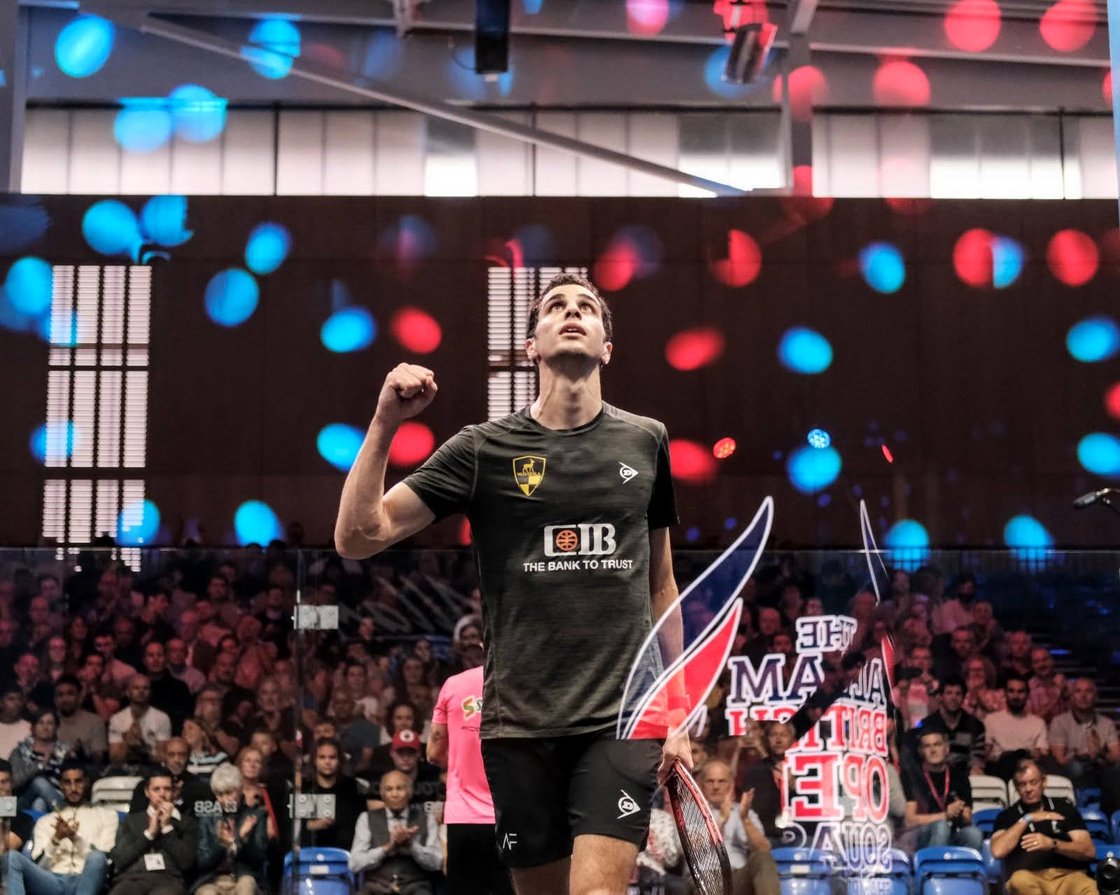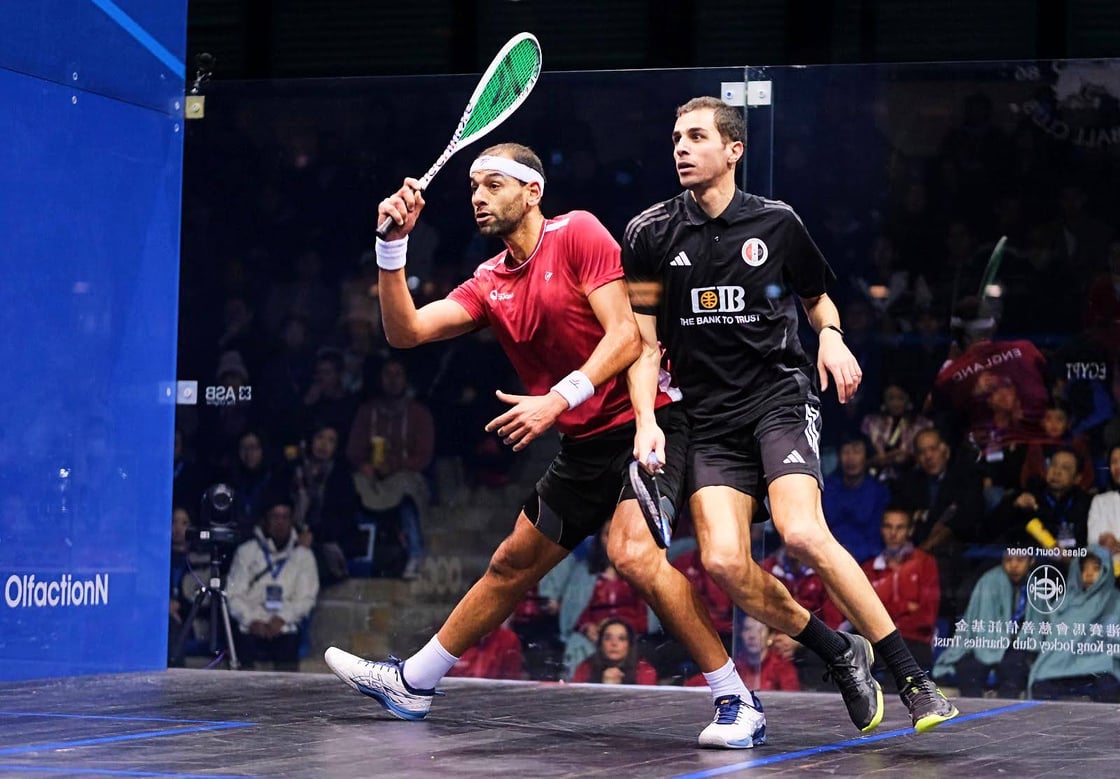You've likely seen the news of Ali Farag's sudden retirement.
It certainly was a shock to the squash community, especially considering that he's still arguably playing at or near his best!
However, after watching Ali's announcement video and reading the article that the PSA released, the Egyptian's decision is much more understandable.
The main reason Farag is retiring, on top of the fact that he's achieved everything he set out to do in the world of squash, is he wants to be more of a part of his children's lives.
Who can blame him? Being a full-time travelling squash professional must take up so much time, and if you've got kids, you're likely to miss many milestones!
Anyway, I think that Ali's retirement deserves its own feature article, especially considering just how much he achieved throughout his career.
So, in this article, I'll be diving into Ali Farag's history, his achievements as a professional squash player, his playing style and persona, and, what's next in store...
Ali Farag's Story Begins
Ali Farag was born on April 22, 1992, in Cairo, Egypt, a country known for producing a seemingly endless supply of squash legends.
Most of you are probably aware, but, if you look at the top 20 players in the men's and women's rankings, a huge percentage of players are from Egypt.
Also, just a side note, I've tried my best to do plenty of research and make sure everything I say is accurate, however, if you spot anything in this newsletter that you know to be inaccurate, please let me know!
Anyway, as you probably expected, Farag played to a very high standard from a young age.
As a teenager, Farag was clearly talented, but he wasn’t necessarily the standout junior in Egypt.
He didn’t win a World Junior Championship, a milestone many of his fellow Egyptians ticked off early in their careers.
Of course, squash was a big part of his life early on, but unlike many of his peers, Farag didn’t fully dive into the sport right away.
His path was a little bit different. Ali grew up in a very supportive family that valued both academics and sport.
So, rather than going all-in on squash straight out of school, he moved to the United States to study at Harvard University, one of the most prestigious universities in the world.
From 2010 to 2014, he balanced high-level academics with university squash. Farag dominated the US collegiate scene, going unbeaten in his final two seasons and helping Harvard win multiple Ivy League titles along the way.
Graduating with a degree in mechanical engineering, he left not just as a highly accomplished student, but as one of the top players in university squash history.
It was after completing university that Ali finally committed to the PSA Squash Tour (or PSA World Tour as it was known then).
While most players spend those early twenties years grinding it out on tour and gaining their experience that way, Farag essentially hit the reset button, starting his professional career in earnest in 2014 at the age of 22.
Other players on the PSA Squash Tour have taken a similar route, I'm pretty sure that England's Gina Kennedy did this, and perhaps France's Victor Crouin too (but please correct me if I'm wrong).
I remember Gina Kennedy joining the women's Tour and flying up the rankings in her first few months, which was exciting to see.
From a mental perspective, it can't be easy jumping from full-time education to being a full-time professional squash player, you'd expect some teething problems when players are adjusting to full-time life...
But of course, Ali seemed to cope pretty well (as you might imagine given the career that was to follow).
A Look Back At Ali's Career
Within just a couple of years of starting his professional career in 2014, Farag had already started making waves as one of the most intelligent and graceful athletes on the circuit.
His squash IQ was already unbelievably impressive.
Farag’s first major title came in 2016 at the Motor City Open, but it was really in 2017 and 2018 that he started turning heads more consistently.
That period saw him beat some of the biggest names in the sport and start establishing himself as a serious title contender.
Then came 2018–19, arguably one of the biggest turning points of his career where Ali went from 'great player' to 'legendary status'.
Farag won his first World Championship in Chicago in 2019, beating Tarek Momen in the final.
Not long after (around March 2019), he ascended to World No.1 for the first time, becoming the first Harvard graduate to achieve that feat, which is pretty mad when you think about it.
Since then, Farag has spent 238 weeks at World No.1 between and won 46 PSA Squash Tour titles throughout his career. According to an article on the PSA website, this puts him at sixth on the all-time men’s winners list.
In total, Farag has won 4 PSA World Championships (2019, 2021, 2023, 2024), which puts him joint-second in the men’s all-time list (on par with fellow legend Amr Shabana), behind only Jahangir and Jansher Khan.
He’s also picked up numerous Platinum-level titles, including the U.S. Open, Egyptian Open, Hong Kong Open, and British Open. I think he’s won the U.S. Open either four or five times.
Consistency and adaptability are two of Ali's main strong points (as I'll cover in the next section).
It’s easy to forget how difficult it is to stay at the top once you get there. Injuries, fatigue, younger players coming through, there are so many things to worry about.
But Ali always seemed to find a way to raise his level at the right moments take major wins and comeback from deficits.
Even now in 2025, Farag was still very much a force to be reckoned with. Arguably being at the top of his game, this is what made his retirement all the more sudden.
Not only did Ali Farag hit the very top of the sport multiple times and hold onto it, but he stayed there with grace, humility, and an enduring love for the game, which made him so easy to root for.

Photo credit: Steve Cubbins
Ali's Trademark Style of Play
If you’ve ever watched Ali Farag in full flow, you’ll know that he makes squash look effortless.
There’s a calmness to the way he plays that’s honestly hypnotic.
Whether it’s a major final or the early rounds of an event, Farag very rarely (if ever) looks rushed, rattled, or flustered... just smooth, efficient, and always in control.
One of the first things people tend to notice is how he moves. His court coverage is outrageous.
He glides around the floor with such fluidity that it's almost like he's floating. There’s something unique about his footwork and his ability to accelerate without any visible strain.
This is one of the main reasons why he picked up the nickname 'Mr Fantastic'. Tall, slim, springy, and impossible to catch out of position. His opponent could hit a perfect drop, but if it doesn't roll out of the nick, Ali will reach it.
Then there’s the racquet work.
Farag’s swing isn’t what you’d call traditional. His backswing is pretty short, quite wristy, and I've said in the past that his technique could even be considered unorthodox.
If he was lower down the rankings, it would be easy to construe his swing as a weakness, but, given his ranking and career, it's clear that Ali's swing is a strength.
It does't affect his shot accuracy at all, and, it that low swing preparation (combined with his strong wrist), makes for some incredibly good deception.
His ability to disguise drop shots, or, to hold and flick last-second cross courts with barely any preparation makes Mr Fantastic a nightmare to read.
From a tactical standpoint, Farag played an extremely low-risk, high-reward game.
His margin for error was minimal, and yet he barely made any. It wasn’t unusual to watch him go through an entire game without hitting a single unforced error. And when he did attack, it was with purpose, timing, and immaculate weighting.
Of course, Ali does the basics unbelievably well. His drives were tight, consistent, and always hit their target (dying on the second bounce in the back corner).
Farag is amazing at squeezing his opponents into awkward positions or forcing weak returns that he’d volley away with ease.
And, in the rare situations in which he was under pressure, Ali's ability to reset using straight and crosscourt lobs is awesome too.
This is one of the reasons he was so hard to beat, even if he looked as though he was on the ropes in a rally, his opponent was never really in control.
His squash IQ and shot selection was arguably the best on tour during his peak years.
Ali never forced it. He'd wait, work the rally, and then, when the opening came, he’d strike with the kind of calm assurance that only comes from a deep understanding of the game.
There was a simple rhythm to his play, not flashy or explosive like many of his Egyptian rivals, but incredibly measured and intelligent.
Statistically, Ali Farag is just as impressive.
He played a total of 563 PSA matches and won 452 of them, giving him a career win rate of 80.2%, which is elite by any standard.
And there's a stat that always stuck with me (even if I can’t remember the exact number).
It was during one of his matches this season in which a commentator pulled out the fact that, when Ali lost the first game, he still went on to win the match a huge percentage of the time.
It just speaks volumes about his style, never panicking, never deviating from the plan, and always finding a way to get back on top.
Just imagine going 1-0 against Ali Farag and knowing you're still very likely to lose the match.
This again demonstrates Ali's phenomenal squash IQ. If he was doing something wrong tactically, he would go off court between games and figure out a new plan of action, then execute it with purpose.
In a sport that’s often defined by pace, power, and aggression, Ali Farag definitely stands out by doing the opposite.
He played with poise, patience, and an uncanny ability to make his opponents feel like they were working twice as hard just to keep up.
It’s no wonder he earned so much respect from his rivals, not just for what he won, but for how he won.
Ali's Rivalries
Ali is one of only a handful of players to dominate an era (or arguably multiple eras) that also included names like Nick Matthew, Mohamed ElShorbagy, and Gregory Gaultier (in the earlier days), and, Karim Abdel Gawad, Mostafa Asal, and Mohamed ElShorbagy (later down the line).
Not to mention the rise of Diego Elias in the past couple of seasons. However, even now, Ali managed to find a way to jump ahead of Elias soon after he took the World No.1 spot.
That's just what Ali is good at, adapting and learning.
The main rivalry that is worth mentioning was between Farag and Mohamed ElShorbagy.
Ali actually admitted in an interview that Mo ElShorbagy (AKA The Beast) was the biggest rival of his career.
While I didn't watch as much SquashTV back then as I do now, I've gone back and watched a lot of old footage of my favourite players throughout the years on YouTube.
Matches between Mohamed ElShorbagy and Ali Farag were always intense and fiery. They were tactically fascinating, physically brutal, and often decided by just a few crucial points.
Mohamed brought relentless pace and power, looking to overwhelm Ali from the very first rally, while Farag answered with his signature calmness, resilience, and precision.
They couldn’t have had more different styles, and yet they were constantly pushing each other to new heights.
At one point, it felt like every major final came down to these two.
They traded World No.1 rankings, swapped victories on the biggest stages, and shaped the narrative of modern squash for a good few years.
What made it even more compelling was the mutual respect, despite the fire on court, there was a clear admiration between the two. They brought the best out of one another, and squash fans were the lucky beneficiaries.
But ElShorbagy wasn’t the only one to challenge Ali’s dominance.
In the earlier years of his rise, Farag had to contend with the clinical shotmaking of France's Gregory Gaultier and the brutal attrition game of Nick Matthew, two legends of the previous era who still had plenty of bite left when Ali was breaking through.
While he didn’t have as many high-profile battles with them as he did with Mo, those early encounters were crucial in sharpening Ali’s game and preparing him for the years ahead.
In more recent seasons, Mostafa Asal has emerged as a controversial but undeniably talented rival.
Where Farag was calculated and composed, Asal brought intensity, raw power, and a more chaotic brand of squash.
Their clashes were always dramatic, not just because of the contrast in styles, but because of the narrative surrounding them.
Farag, the statesman of the game. Asal, the unpredictable 'Raging Bull' (as he's nicknamed).
Watching them share a court often feels like a generational clash and Asal is one of the few players that really pushes Ali to his absolute brink.
And of course, we can’t forget Diego Elias.
For a time, it looked like Elias had finally broken through the glass ceiling, finally climbing to that to World No.1 spot and announcing himself as the new sheriff in town.
But Farag the problem-solver responded like he always did, with a series of composed, clinical wins that reasserted his dominance. It was classic Ali...
Learning, adapting, and re-emerging with the answers.
As I mentioned above, Ali's major strength was that he studied his opponents. He made adjustments. He found weaknesses. And he never let his position at the top get in the way of improvement (or his love for the game).
That’s what made him such a formidable presence for so long, he didn’t just rely on talent or fitness, he also out-thought people.

Photo credit: Steve Cubbins
The Second Reason Why He's Called Mr Fantastic
I'll keep this section brief, but it's something that needs to be touched on, and that's Ali's persona.
Of course, Ali Farag earned the nickname Mr Fantastic partly because of how he moves, but, the second reason is just as important... he’s also a fantastic person!
On court, Farag is the epitome of fairness, honest, respectful, and a model of sportsmanship. Yet at the same time, he’s fiercely competitive, never giving an inch and always pushing for the win. That balance is rare.
You never see anger get the best of him or force him to make rash decisions, but the fiery passion to win is always there.
Then, off the court, he’s earned admiration from fans and fellow players alike for his humility, intelligence, and the way he represents the game.
Whether it’s post-match interviews, press conferences, or interactions with younger players, Ali always speaks with thoughtfulness and a genuine respect for the sport, his opponents, and his supporters.
In short, he’s not just one of the best players of his generation, he’s one of the best ambassadors squash could ask for.
What Does The Future Hold For Ali?
Ali's sudden retirement certainly shocked the squash world, marking a farewell chapter for one of squash’s most admired champions.
It's certainly a shame that we aren't getting the chance to see him in action one last time at the British Open, but, if the timings right for Ali, then we must respect that he's made the right decision.
In his own words, from his recent interview with the PSA about the retirement move (which you can read in full by clicking here, but make sure to head back to the newsletter):
“Squash been my passion, my identity and my purpose for as long as I can remember, but there was always another part of me, a family man. Now, I’m a husband and a father to two beautiful young girls, one about to turn four and the other born three months ago.
I’ve missed so many of the milestones that I wanted to be there for: the school pickups, the late-night cuddles, the bedtime stories. All of those things that pass too quickly when you’re always chasing the next flight, the next match, the next tournament.
I’ve always believed in balance, and I feel like the balance has shifted now. This is what I want the next chapter to be.
I’m walking away at the perfect time. Squash is in a place it has never been and the level is higher than ever in the men’s and women’s game. Even if I’m not playing, you can count on me always being there as a fan, a supporter and someone who will always love this game.”
Ali’s legacy is already secure as one of the most accomplished, consistent, and elegant careers the sport has seen.
What’s next? Probably that much-needed family time he talked about above...
But also hopefully a continued presence in squash, whether through coaching, commentary, or just cheering courtside.
Mr Fantastic may be stepping away from competition, but his impact on the game has certainly left its mark.
Best of luck for the future, Ali!
This article was taken from our On The 'T' Newsletter, if you're interested in receiving more content like this, please feel free to sign up using the subscribe section located at the bottom left of this page (or underneath the article if you're on mobile), thanks!
